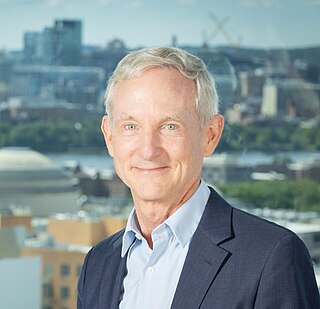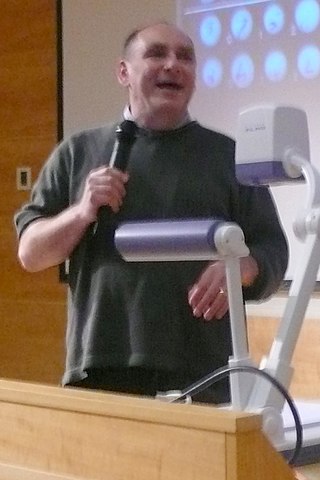Related Research Articles

Stephen Byram Furber is a British computer scientist, mathematician and hardware engineer, and Emeritus ICL Professor of Computer Engineering in the Department of Computer Science at the University of Manchester, UK. After completing his education at the University of Cambridge, he spent the 1980s at Acorn Computers, where he was a principal designer of the BBC Micro and the ARM 32-bit RISC microprocessor. As of 2023, over 250 billion ARM chips have been manufactured, powering much of the world's mobile computing and embedded systems, everything from sensors to smartphones to servers.

The British Computer Society (BCS), branded BCS, The Chartered Institute for IT, since 2009, is a professional body and a learned society that represents those working in information technology (IT), computing, software engineering, computer engineering and computer science, both in the United Kingdom and internationally. Founded in 1957, BCS has played an important role in educating and nurturing IT professionals, computer scientists, software engineers, computer engineers, upholding the profession, accrediting Chartered IT Professional (CITP) and Chartered Engineer (CEng) status, and creating a global community active in promoting and furthering the field and practice of computing.

Jack Joseph Dongarra is an American computer scientist and mathematician. He is a University Distinguished Professor Emeritus of Computer Science in the Electrical Engineering and Computer Science Department at the University of Tennessee. He holds the position of a Distinguished Research Staff member in the Computer Science and Mathematics Division at Oak Ridge National Laboratory, Turing Fellowship in the School of Mathematics at the University of Manchester, and is an adjunct professor and teacher in the Computer Science Department at Rice University. He served as a faculty fellow at the Texas A&M University Institute for Advanced Study (2014–2018). Dongarra is the founding director of the Innovative Computing Laboratory at the University of Tennessee. He was the recipient of the Turing Award in 2021.
Ian Tremere Foster is a New Zealand-American computer scientist. He is a distinguished fellow, senior scientist, and director of the Data Science and Learning division at Argonne National Laboratory, and a professor in the department of computer science at the University of Chicago.

Charles Eric Leiserson is a computer scientist and professor at Massachusetts Institute of Technology (M.I.T.). He specializes in the theory of parallel computing and distributed computing.

Frank Thomson "Tom" Leighton is an American mathematician who is the CEO of Akamai Technologies, the company he co-founded with the late Daniel Lewin in 1998. Leighton discovered a solution to free up web congestion using applied mathematics and distributed computing. Under his leadership, Akamai has evolved from its origins as a content delivery network (CDN) into the world's most distributed cloud platform, with leading solutions for content delivery, cybersecurity, and cloud computing.

David A. Bader is a Distinguished Professor and Director of the Institute for Data Science at the New Jersey Institute of Technology. Previously, he served as the Chair of the Georgia Institute of Technology School of Computational Science & Engineering, where he was also a founding professor, and the executive director of High-Performance Computing at the Georgia Tech College of Computing. In 2007, he was named the first director of the Sony Toshiba IBM Center of Competence for the Cell Processor at Georgia Tech.
Carl Kesselman is an American computer scientist specializing in grid computing technologies. This term was developed by him and professor Ian Foster in the book The Grid: Blueprint for a New Computing Infrastructure. He and Foster are winners of the British Computer Society's Lovelace Medal for their grid work. He is institute fellow at the University of Southern California's Information Sciences Institute and a professor in the Epstein Department of Industrial and Systems Engineering, at the University of Southern California.

Yale Nance Patt is an American professor of electrical and computer engineering at The University of Texas at Austin. He holds the Ernest Cockrell, Jr. Centennial Chair in Engineering. In 1965, Patt introduced the WOS module, the first complex logic gate implemented on a single piece of silicon. He is a fellow of both the Institute of Electrical and Electronics Engineers and the Association for Computing Machinery, and in 2014 he was elected to the National Academy of Engineering.

Chung Laung Liu, also known as David Liu or C. L. Liu, was a Taiwanese computer scientist. Born in Guangzhou, he spent his childhood in Macau. He received his B.Sc. degree in Taiwan, master's degree and doctorate in the United States.
Grid-oriented Storage (GOS) was a term used for data storage by a university project during the era when the term grid computing was popular.
Edward Seidel is an American academic administrator and scientist serving as the president of the University of Wyoming since July 1, 2020. He previously served as the Vice President for Economic Development and Innovation for the University of Illinois System, as well as a Founder Professor in the Department of Physics and a professor in the Department of Astronomy at the University of Illinois at Urbana-Champaign. He was the director of the National Center for Supercomputing Applications at Illinois from 2014 to 2017.

Jonathan Andrew Crowcroft is the Marconi Professor of Communications Systems in the Department of Computer Science and Technology, University of Cambridge, a visiting professor at the Department of Computing at Imperial College London, and the chair of the programme committee at the Alan Turing Institute.
Martin Campbell-Kelly FCBS FLSW is an Emeritus Professor at the University of Warwick who has specialised in the history of computing.

Christopher Ray Johnson is an American computer scientist. He is a distinguished professor of computer science at the University of Utah, and founding director of the Scientific Computing and Imaging Institute (SCI). His research interests are in the areas of scientific computing and scientific visualization.
Ingemar J. Cox is Professor and Director of Research in the Department of Computer Science at University College London, where he is Head of the Future Media Group, and he is Professor in the Machine Learning department at the University of Copenhagen. Between 2003 and 2008, he was Director of UCL's Adastral Park Campus.

Chai Keong Toh is a Singaporean computer scientist, engineer, industry director, former VP/CTO and university professor. He is currently a Senior Fellow at the University of California Berkeley, USA. He was formerly Assistant Chief Executive of Infocomm Development Authority (IDA) Singapore. He has performed research on wireless ad hoc networks, mobile computing, Internet Protocols, and multimedia for over two decades. Toh's current research is focused on Internet-of-Things (IoT), architectures, platforms, and applications behind the development of smart cities.

Albert Y. Zomaya is currently the Chair Professor of High Performance Computing & Networking and Australian Research Council Professorial Fellow in the School of Information Technologies, The University of Sydney. He is also the Director of the Centre for Distributed and High Performance Computing. He is currently the Editor in Chief of IEEE Transactions on Sustainable Computing and Springer's Scalable Computing and Communications. He was past Editor in Chief of the IEEE Transactions on Computers.
Mootaz Elnozahy is a computer scientist. He is currently a professor of computer science at University of Texas at Austin. He was a professor of computer science at the computer, electrical and mathematical science, and engineering (CEMSE) division at King Abdullah University of Science and Technology from 2012-2024. He previously served as Special Advisor to the President and Dean of CEMSE. Elnozahy's research area is in systems, including high-performance computing, power-aware computing, fault tolerance, operating systems, system architecture, and distributed systems. His work on rollback-recovery is now a standard component of graduate courses in fault-tolerant computing, and he has made seminal contributions in checkpoint/restart, and in general on the complex hardware-software interactions in resilience.

Ishfaq Ahmad is a computer scientist, IEEE Fellow and Professor of Computer Science and Engineering at the University of Texas at Arlington (UTA). He is the Director of the Center For Advanced Computing Systems (CACS) and has previously directed IRIS at UTA. He is widely recognized for his contributions to scheduling techniques in parallel and distributed computing systems, and video coding.
References
- 1 2 3 "Frank Z. Wang". IEEE Xplore. Retrieved 13 October 2024.
- ↑ "Frank Wang, Professor of Future Computing". University of Kent. Retrieved 12 September 2020.